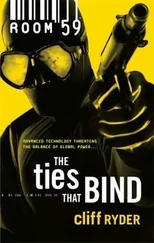I got up too and stood in the dim light at the top of the stairs to watch. I could see Lyman below in the front hallway; he had his heavy overcoat on and he was wearing his winter cap with the corduroy earflaps. Beside him on the floor was a metal suitcase with a belt strapped around it. My dad and he were talking, and though I couldn’t hear what they were saying, I could tell that Lyman was more than a little excited. He began to tie and untie the strings on the earflaps of his cap, and he was shifting from one foot to the other like he had to use the toilet. In my goofy sleepiness I wondered whether that was the reason why he had come over — to piss in our pot — except that wouldn’t have explained why he had brought a suitcase. Then my mother was there, too, beside me at the top of the stairs.
“Sanders,” she said. “Go back to bed.”
“It’s Lyman Goodnough.”
“I don’t care who it is. I want you to get dressed or to go back to bed.”
My mother had a maroon robe on with matching open-toed slippers. Her blond hair, treated so that it stayed blond, looked freshly combed.
“Lyman’s seen striped pajamas before,” I said.
“That is not the point.”
“Here comes dad.”
My dad came up the stairs and met us at the top landing. His face and neck and hands were dark tanned to the shirt line; against the rest of him they looked purple in the dim light. He had black hair on his bare chest and he was smiling.
“So the vigilantes are up too,” he said.
“This is not the time for your jokes,” my mother said. “What does that man want?”
“You mean Lyman Goodnough.”
“I know who it is. What’s wrong with him?”
“Nothing particular. He’s just discovered he has something like a backbone.”
“And what’s that supposed to mean?”
“He wants a lift into town.”
My mother looked at my dad as if he was talking utter nonsense, as if she still thought he was trying to be funny. “Now?” she said. “At this hour? Whatever for?”
“He wants to catch the train. He’s leaving.”
“But that’s ridiculous. He can’t do anything. Where can he go?”
“He can go west, I suppose,” my dad said. “That’s the direction the train is headed in.”
“West,” she said. It sounded foolish and obscene in her mouth. “Well, I hope you had the sense to tell him no.”
“No, I told him I would. I come upstairs to get my shirt and boots on.”
“Are you insane?”
“Probably,” my dad said. “And I’m getting cold standing here talking about it.” He turned to go back to their bedroom.
“Dad,” I said. “I want to go.”
“Get dressed then.”
“He’s not going. You’re not going,” my mother said.
But she wasn’t even looking at me. She followed my dad into the bedroom, and I followed her down the hallway and stood in the door. My dad went over to the closet and took a flannel shirt off a hanger. She watched him as if it was a conspiracy against her, as if he and Lyman Goodnough had decided to get up a plot. With one hand fisted at the neck of her maroon robe, she watched him unbutton his pants and begin to tuck his shirt in.
“Will you tell me,” she said, “why that man can’t at least drive himself to town?”
“Yes, but you aren’t going to like it.”
“Of course not. I don’t like any of this. But I assume you mean it’s something more than just the fact that he can’t get his own car started.”
“He never tried it,” my dad said. “He’s afraid if he starts the car it’ll wake the old man.”
“Oh,” she said. “Well, that does make sense, doesn’t it. He can’t wake his own father but it’s perfectly all right to wake us.”
“I said you weren’t going to like it.”
“Yes, you did say so and you are right about that. But what about her? What about his sister? I suppose she’s afraid to disturb the poor old man too.”
My dad stopped dressing then and looked at my mother. He wasn’t happy. “Leave her out of this,” he said.
“Or hasn’t she learned how to drive a car at night yet? I’ve never seen her driving a car at night.”
“Keep your mouth off her,” he said. “You don’t know what you’re talking about.”
“Yes, I do,” she said. “I know more than you think I do.”
“No, you don’t,” he said. “You don’t know the half of it.”
“All right,” my mother said, looking at me in the doorway. “I’ve had enough for one night. I’m going to bed.”
“That’s right,” my dad said. “I think that’s a good idea.”
“And you are too,” she said to me.
“No, I’m not,” I said. “I’m going along. Dad, you said—”
“I told you to get dressed,” he said.
“No. That’s definitely out. He’s not going.”
“It won’t hurt him.”
“He’s not going,” she said. “He has school tomorrow. He’s no Edison, or haven’t you noticed?”
“It won’t hurt him. And he can still make school.”
“I don’t want him to go with you. I forbid him to go.”
“I believe he’s going, though.”
“AH right,” she said. “All right, go then.”
But she wasn’t looking at me. She was watching my dad. It didn’t have anything to do with me anymore — if it ever did.
“Go,” she said. “You may as well get yourself involved in this too. You’re just like him. You don’t care what I think. Why do you bother to ask?”
But she didn’t go back to bed yet and she wasn’t finished talking. She had more to say to my dad. From their bedroom down the hall I could hear her talking to him while I got out of my pajamas. Her voice was going on and on with steel in it, like she was some lawyer summing up the defense in a bad case, and even though by 1941 it must have been an old defense and an old case, she did not sound tired of it. There was all that steel and ice mixed up in it. But my dad wasn’t saying anything. I could hear just the sound of him sitting down on the edge of the bed to put his boots on and the noise on the wood floor as he stamped into them. Then I was dressed and out in the hallway again ready to go downstairs, and I heard him say something to her. It sounded like two words, and they must have been enough, or too much maybe, because after he said them it was only silence coming out of their bedroom. I went downstairs.
Lyman was still standing in the front hallway. The strings of his earflaps were tied tight in a double knot under his chin pulling the bill of his cap down low on his forehead like he was expecting heavy weather, and he was standing there holding his suitcase.
“You coming along too?” he said. “For the send-off?”
“Yes, sir.”
I put my coat and stocking cap on, and we stood facing one another, waiting for my dad. We examined the rug and each other’s feet.
“At least,” Lyman said after a while, “at least it don’t look like it wants to snow.”
“No, sir.”
“I hope it don’t,” he said. “Not anyhow.”
The rug was an oval braided one made of bright rags, and Lyman’s shoes were his best, those black polished shoes he must have worn to the Holt Tavern a year earlier. They had sand on them now from his walking the half mile to our house. The sand was getting on my mother’s rug.
“Well,” Lyman said. “How’s the sixth grade?”
“What?”
“The sixth grade. At your school in town.”
“I’m in the eighth grade,” I said.
“Eighth,” he said. “Well, don’t never quit.”
“No, sir.”
“Take me,” he said. “You never know when you might need all your education.”
“Yes, sir.”
“That’s right,” he said. Then like he’d been pondering this question for a good long time, he said, “What’s the capital of California?”
Читать дальше












